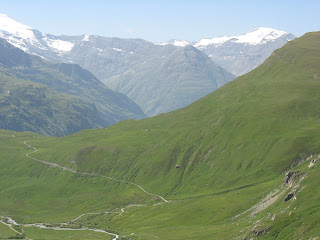
One of the most frustrating things about the Tour is that you have to buzz through so many wonderful places at high speed. The only consolation is that you get to go back to some of the same places year after year and take small repeat bites of the same apple.
The Tour usually skirts the Mediterranean Sea every year on its way between the Pyrenees and the Alps, which gives me a chance to visit one of my favorite spots in the world. I love it so much, in fact, that I'm not giving it away, other than to say that it's on an inland body of water about 20 minutes from a major highway. It's a tranquil village near beaches and oyster beds and flocks of flamingos, and I don't know anywhere else like it in France.
The hotel owners know me by now. They know I will arrive late, tired and sweaty, and that I'll want a table for one at their wonderful seafood restaurant, and that I'll bring a paperback and linger a long time. It happened to be Bastille Day on one of my visits, and I watched enthralled as the surrounding communities set off their fireworks shows one by one into the night sky. Another time, I watched a crew from a Belgian TV station, who also apparently were Tour regulars, devour two enormous, multi-level seafood towers like so many sharks.
Leaving and plunging back into the madness is always really hard.
My Tour waystations aren't always oases of this particular kind. I mentioned in a previous post that Toulouse -- an unavoidable destination in any Tour itinerary -- poses special problems for my GPS-challenged mind. My place there sits in a completely nondescript industrial park-type area just off the ring road, but I know how to find it, which is key. It's clean and has all the basics, including a night shift guy who will draw you a draft beer at any hour. I booked it for three nights this year and used it as a hub for several stages.
I hadn't ventured into Toulouse proper in a few years, since a very unfortunate experience in which I became so lost in the maze (to be fair, the entire downtown was under construction at the time) that the hotel proprietors, assuming I would never make it, sold the room out from under me. But a colleague talked me into it last night after we were finished writing our stories off the scintillating Plateau de Beille stage. Knowing my Toulousophobia, he offered to lead me in. That plan worked fine until he swept over two lanes and nipped onto an exit ramp I couldn't get to because of onrushing traffic.
I got off at the next exit and immediately felt a Zen calm descend. It's good to face your worst fears. I kept following signs for the centre ville, communicating with my friend by telephone, and eventually popped out in the Place du Capitole, and it was worth the journey. Here is the view from the dinner table:

Much like a sprinter on an unfamiliar course finish, I needed another lead-out to the autoroute, but I found my little industrial park palace without incident and was unaccountably proud of myself.
Tonight I head for Pau, and in a Tour first for me, will have back-to-back stays of three nights apiece in the same place. I always book the same joint in Pau, too. It's not at all fancy, but it's a short walk from the press center, the stage start and the sweet little pedestrian area where everyone -- riders, race staff, journalists alike -- gathers on the rest day for lunch, dinner and drinks.
There are always other Tour writers at this hotel. Because we usually arrive in the middle of the night from some godforsaken spot in the Pyrenees, long after the owner has gone to bed, he gives us the secret code to open the door and leaves our keys with room numbers and names attached in a white cabinet in the hallway.
I generally call the hotel proprietor every year the day the Tour route is announced to reserve my room. Who wants to take chances with such a jewel? This year, however, I forgot, and phoned him in a panic three days later. "Madame DeSimone,'' he said. "I have saved a room for you. How many nights?''
Many French hotels still prefer to get a real, live fax confirming your reservation rather than a mere ephemeral e-mail. When I send mine off to places like this, I always include a little catchphrase in the flowery style people expect of business letters in France. "It'll be a great pleasure to stay with you again,'' I write, and I mean it.










 Working the start, for a journalist, is usually a lot of effort balanced against very little face time. The traffic getting in is insane. The exit is insane. If you do what I did today and park in "presse avant,'' meaning I drove the course ahead of the race, you have to jump when the Tour rings a series of bells, get in your car and vroom off (think checkered flag) or you'll be blocked for hours.
Working the start, for a journalist, is usually a lot of effort balanced against very little face time. The traffic getting in is insane. The exit is insane. If you do what I did today and park in "presse avant,'' meaning I drove the course ahead of the race, you have to jump when the Tour rings a series of bells, get in your car and vroom off (think checkered flag) or you'll be blocked for hours.